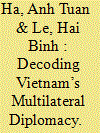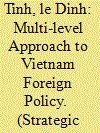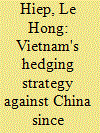| Srl | Item |
| 1 |
ID:
186603


|
|
|
|
|
| Summary/Abstract |
This article explains Vietnam’s recent proactive approach to multilateral diplomacy, defined as diplomatic performance in multilateral institutions. It argues that Hanoi’s embrace of multilateral diplomacy is best explained through the lens of national interests. Vietnam has consistently placed its foreign policy in the broader dynamics of international politics. Since Ho Chi Minh, the founding father of the nation, started his struggle for the national liberation of Vietnam, multilateral institutions have been perceived as one important direction to raise Vietnam’s voice and gather supports from the international community to serve the country’s utmost interest of gaining national independence. After the independent state of Vietnam was established, Hanoi continued to pursue multilateral diplomacy to advance Vietnam’s national interests of defending the country’s security, advancing socio-economic development, and improving its role and stance in the international community. This approach is particularly hailed in recent years as a way to avoid becoming a proxy to big power competition, to mitigate significant security challenges, and to sustain economic development.
|
|
|
|
|
|
|
|
|
|
|
|
|
|
|
|
| 2 |
ID:
181182


|
|
|
|
|
| Summary/Abstract |
Prior to 1995 when Vietnam joined ASEAN and normalized relationship with the United States, the overriding concern was security as could be well explained by realism. Vietnam has made several critical, strategic moves since 1995 and by 2030 the country may be able to act internationally as an emerging middle power. Taking a multi-level approach and empirical evidences of 35 years of Doi Moi (renovation), this article attempts to clarify as to how Vietnam has been in a better position to ensure the security goal by embarking on an ambitious development strategy and expanding its international role.
|
|
|
|
|
|
|
|
|
|
|
|
|
|
|
|
| 3 |
ID:
124468


|
|
|
|
|
| Publication |
2013.
|
| Summary/Abstract |
Since the normalization of Sino-Vietnamese relations in 1991, Vietnam's China policy has been shaped by a combination of approaches which can be best described as a multi-tiered, omni-directional hedging strategy. The article argues that hedging is the most rational and viable option for Vietnam to manage its relations with China given its historical experiences, domestic and bilateral conditions, as well as changes in Vietnam's external relations and the international strategic environment. The article examines the four major components of this strategy, namely economic pragmatism, direct engagement, hard balancing and soft balancing. The article goes on to assess the significance of each component and details how Vietnam has pursued its hedging strategy towards China since normalization.
|
|
|
|
|
|
|
|
|
|
|
|
|
|
|
|